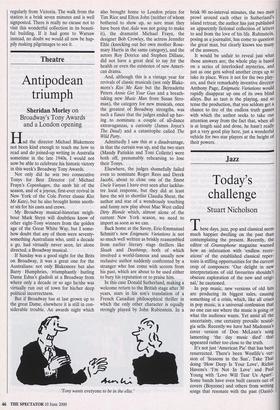Jazz
Today's challenge
Stuart Nicholson
These days, jazz, pop and classical seem much happier dwelling on the past than contemplating the present. Recently, the editor of Gramophone magazine warned how an infatuation with 'endless recre- ations' of the established classical reper- toire is stifling opportunities for the current crop of composers: 'Our delight in new interpretations of old favourites shouldn't obscure exploration of the new and origi- nal,' he cautioned.
In pop music, new versions of old hits are producing its biggest sales, causing something of a crisis, which, like all crises in pop music, is a universal confession that no one can see where the music is going or what the audience wants. Yet amid all the uncertainty, one certainty prevails: nostal- gia sells. Recently we have had Madonna's cover version of Don McLean's song lamenting 'the day music died' that appeared rather too close to the truth.
It's not just 'American Pie' that has been resurrected. There's been Westlife's ver- sion of 'Seasons in the Sun', Take That doing 'How Deep Is Your Love', Richie Havens's 'I'm Not In Love' and Paul Young with 'Love Will Tear Us Apart'. Some bands have even built careers out of covers (Boyzone) and others from writing songs that resonate with the past (Oasis). And as for jazz, once dubbed the 'sound of surprise', things there haven't been sound- ing very surprising for over a decade.
The reason has been a return to a tradi- tion-based synthesis of earlier styles, cham- pioned by trumpet player Wynton Marsalis, that has had the effect of draining jazz of its distinctive energy and truth by returning to tried and tested styles of the past, in par- ticular the hard bop mainstream of the late Fifties and early Sixties.
Historically, jazz was characterised by a flight from the status quo but in recent times it's been redefining itself as a flight back to it, repossessing a comfortably accessible mainstream that re-encapsulates circumscribed styles, sounds and attitudes. This might suit America's colleges and uni- versities who seek to use the music as an alternative conservatory style for training young musicians as much as it suits record companies who in these conservative times seek a tangible product that they can sell into well-defined markets, but it has meant things have all got a bit boring of late.
But there is hope. The recent signing of trumpeter, composer and conceptualist Dave Douglas by recording giant RCA Vic- tor represents a bold step into the future. Douglas is not a ridiculously young musi- cian and he does not wear a suit, hitherto apparently important qualifications in order to be signed by a major label during the last 15 years. At 37, this graduate of the New England Conservatory and New York University has refined his music at the mar- gins of jazz and, unconcerned by current jazz propriety, has come up with an original voice and concept that is new and fresh.
What Douglas realised was that in jazz today it is now no longer sufficient simply to aspire to high levels of executive fluency on your chosen instrument. Virtuosity is a given among today's crop of conservatory- trained jazz musicians. The challenge now is to create an original context in which to feature jazz improvisation that translates the putative opposites of improvisation and composition within original ensemble tex- tures. It has occupied Douglas for the last decade in various groups he has led, includ- ing the Tiny Bell Trio, Charms of the Night Sky and his sextet that produced his latest album, Soul on Soul (RCA Victor 09026 63603-2).
In Douglas's hands jazz once again becomes a living, developing art form. The relief is palpable. His week-long appear- ance at the famous Village Vanguard jazz club in New York with his Soul on Soul group was greeted by crowds queuing around the block for each of the three sets he played nightly. On the final night the somewhat phlegmatic doorman eyed the milling crowds outside, far more than the club could hold, and was heard to say that he'd never had to turn away so much busi- ness. A small sign to be sure, but Dave Douglas might just be the man to lead jazz around the renascent roadblock and into the future.

































































 Previous page
Previous page